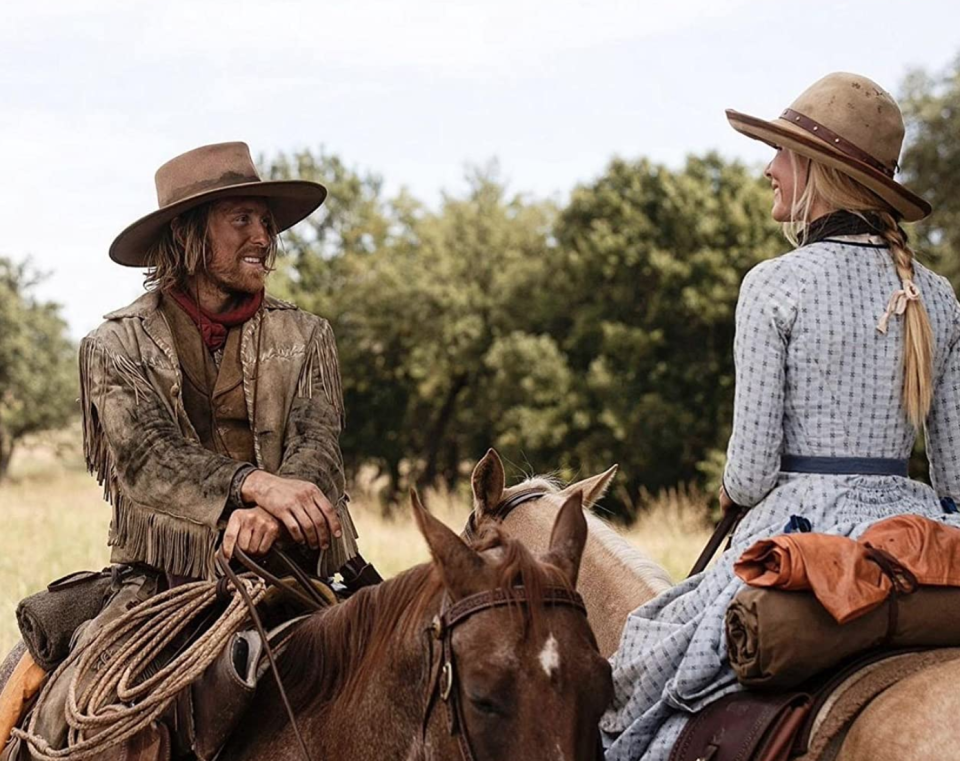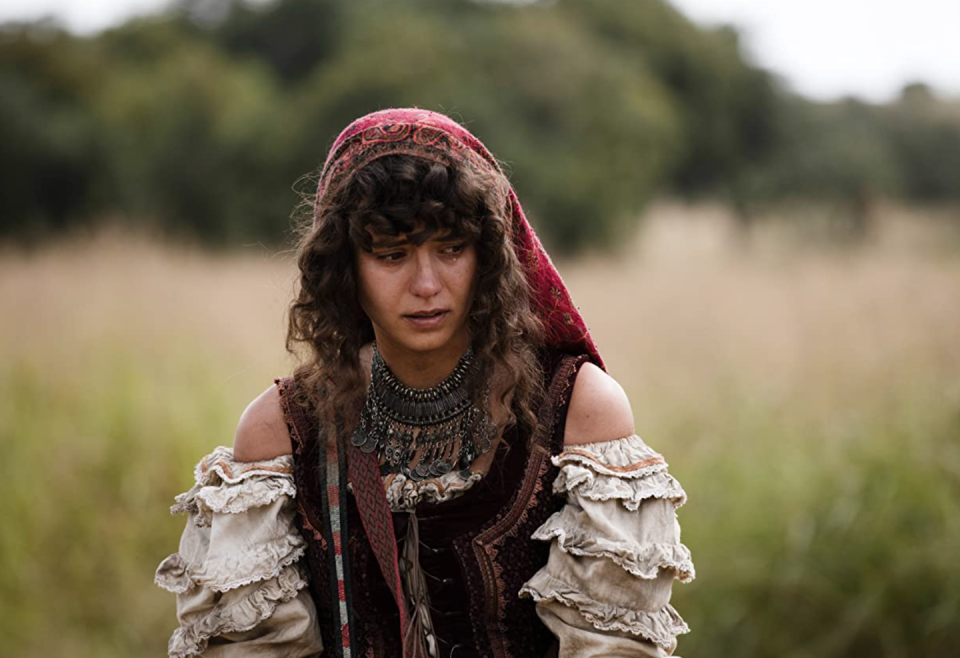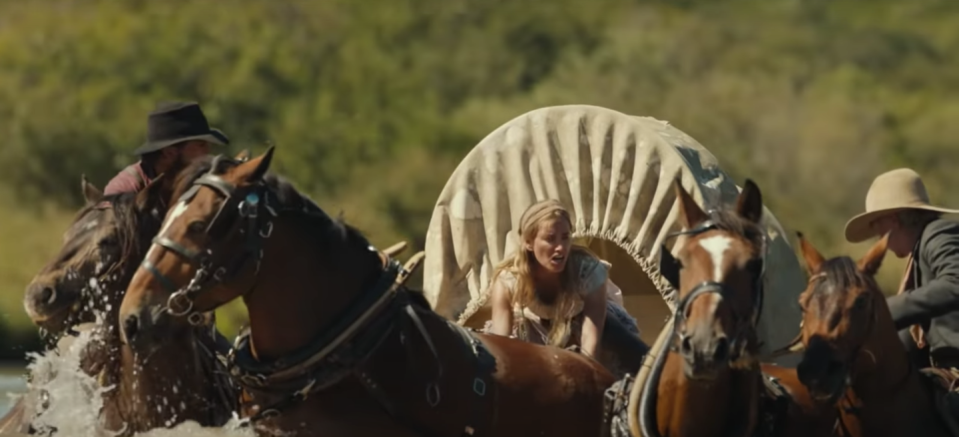‘1883’ Episode 4 Finds John Dutton’s Ancestors Facing Their Biggest Challenge Yet

- Oops!Something went wrong.Please try again later.
- Oops!Something went wrong.Please try again later.
We’re nearly halfway through the first season of the Yellowstone prequel series, 1883, and we haven’t even left Texas. Episode 4, “The Crossing,” finds the migration of European immigrants lead by Shea (Sam Elliot), Thomas (LaMonica Garrett), and James (Tim McGraw), John Dutton’s great grandfather, halted at the Brazos River in north-central Texas—which means they haven’t even crossed what would become the 6666 Ranch yet. The migration is bound for Oregon. Unless we get some time jumping, season 1 doesn’t hold much hope for the wagon train reaching the coast.
By now, the series has firmly shaken the romanticism of western exploration—at least, aside from Elsa (Isabel May), who continues to journal about the wonders of west (Texas). Of course, we know where her optimism leads: a field somewhere along the journey in which the group is ambushed by a tribe of Indigenous Americans.
Episode 4 once again teases future hardships, as the European migrants display continued incompetence (which is termed "bravery" in the episode) during their first river crossing. (But don’t worry, our Dutton heroes cross the river, like, no problem. Because they are capable Americans, we guess?)
Considering the Yellowstone connection, one can read the series as an extended defense of John Dutton. If his family risked so much to travel west and stake the Yellowstone, shouldn’t John work just as hard to defend it? Of course, we haven’t yet seen the violence needed to actually claim the territory. For now, despite the occasional hardship, the series is still a bit Manifest Destiny.
Anyway, here’s what happened in episode 4
She’s the Man

In an opening diary monologue, Elsa muses about the indifference of nature and the loss of a civilized people’s habits as they journey through the unknown. It’s all a bit heavy, but it’s okay because Elsa picks up a frog thing and says she’s now a cowboy.
In camp, she then trades gold jewelry given to her by James for some pants; she realizes horse riding will be easier without a dress.
Ennis seems to dig the look and he and Elsa kiss for the first time, prompting a gushing diary entry about swapping spit. In the morning, Elsa, who should have been up early watching the heard, approaches a seemingly upset Ennis, possibly foreshadowing future trouble.
Also, James watches them kiss, but tells Elsa she is now an adult; he can no longer treat her like a child. (We’ll see how long this mature approach lasts.)
Who’s the Man?

James continues his insubordination, disagreeing with Shea over travel strategy. He has, however, begun to express more respect to the rank, calling Shea “captain.” (The two fought on opposite sides during the war.) The disagreements include when the wagon train should cross the river, and in what order. It is decided they will cross in the afternoon before the storm, sending the people first, then wagons, and then cattle last, to not upset the riverbed and doom the wagon wheels.
Fearing a traffic jam, James makes the decision to move his family a night early in a make-sure-to-secure-your-oxygen-mask-before-helping-others move. Or because he’s just stubborn. Or a jerk.
Shea worries that James’ insolence will become contagious, as some of the cowboys begin to now question Shea’s food strategy; they worry the cattle won’t be sufficient to feed the wagon train. (More foreshadowing of future woes.)
Shea and Thomas reflect on the migrants’ fear and bravery, with Shea proposing that the scariest thing is the unknown. Thomas replies, “that’s only because you haven’t been whipped, Captain.” The exchange suggests there are more motivators for the migrants' journey than future opportunity. It also reveals some of Thomas’ backstory. Later in the episode when Noemi, the gypsy woman who Shea and Thomas helped previously, insinuates a romantic union, Thomas explains the danger of bi-racial relations, dismissing Noemi’s naïveté that American freedom extends to all things.
Take Me to the River, Drown Me in the Water

After a nightmare about his time in the Civil War, Shea leads the wagon train to the river. First, he orders the migrants to lighten their wagons, forcing them to discard furniture and instruments.
The graveyard of supplies left behind reinforces Elsa’s earlier observation about the shedding of customs: as the wagon train goes farther west, the people leave more of their urban-dwelling selves behind. Or as Shea puts it: You’re pilgrims now!
Elsa stays back with the cattle as the wagon train crosses. She plays a discarded piano as we see the migrants brave the river. Several die. At the end of the episode, Elsa crosses and sees her mother, Margaret, in tears.
The threshold crossed, 1883’s journey west now truly begins.
You Might Also Like

